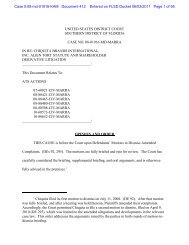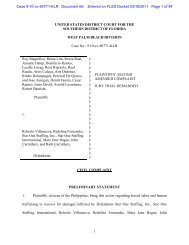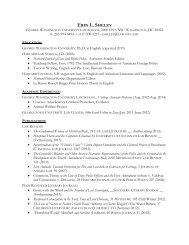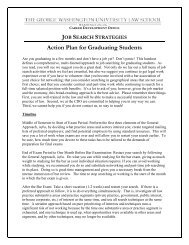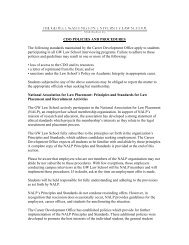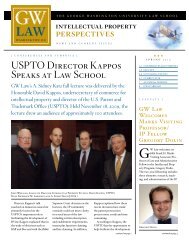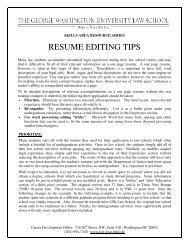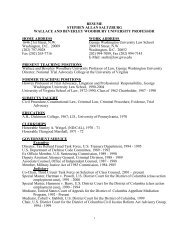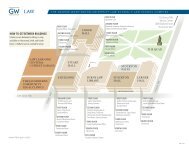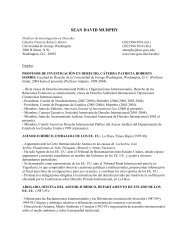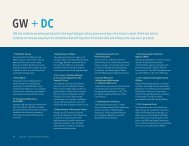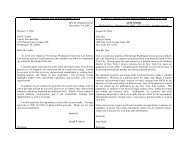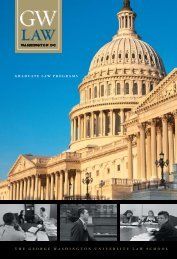CLE Materials for Panel #1 - George Washington University Law ...
CLE Materials for Panel #1 - George Washington University Law ...
CLE Materials for Panel #1 - George Washington University Law ...
Create successful ePaper yourself
Turn your PDF publications into a flip-book with our unique Google optimized e-Paper software.
WILMARTH<br />
4/1/2011 1:11 PM<br />
2011] The Dodd-Frank Act 1055<br />
As an alternative to Dodd-Frank’s regulatory re<strong>for</strong>ms, Congress<br />
could have addressed the TBTF problem directly by mandating a<br />
breakup of large financial conglomerates. That is the approach<br />
advocated by Johnson and Kwak, who have proposed maximum size<br />
limits of four percent of GDP (about $570 billion in assets) <strong>for</strong><br />
commercial banks and two percent of GDP (about $285 billion of<br />
assets) <strong>for</strong> securities firms. Those size caps would require a<br />
significant reduction in size <strong>for</strong> the six largest U.S. banking<br />
organizations (Bank of America, Chase, Citigroup, Wells Fargo,<br />
Goldman, and Morgan Stanley). 452 Like Joseph Stiglitz, Johnson and<br />
Kwak maintain that “[t]he best defense against a massive financial<br />
crisis is a popular consensus that too big to fail is too big to exist.” 453<br />
Congress did not follow the approach recommended by Johnson,<br />
Kwak, and Stiglitz. In fact, the Senate rejected a similar proposal <strong>for</strong><br />
maximum size limits by almost a two-to-one vote. 454 As noted<br />
above, Congress modestly strengthened the Riegle-Neal Act’s 10%<br />
nationwide deposit cap, which limits interstate mergers and<br />
acquisitions involving depository institutions or their parent holding<br />
companies. However, that provision does not restrict intrastate<br />
mergers or acquisitions or organic (internal) growth by LCFIs. In<br />
-06-29/congress-puts-out-sell-order-on-american-banks-david-pauly.html; Christine<br />
Hauser, Banks Likely to Offset Impact of New <strong>Law</strong>, Analysts Say, N.Y. TIMES, June 25,<br />
2010, http://www.nytimes.com/2010/06/26/business/26reax.html (quoting Professor<br />
Cornelius Hurley’s views that Congress “missed the crisis” and that “in no way does<br />
[Dodd-Frank] address the too-big-to-fail issue”).<br />
452 JOHNSON &KWAK, supra note 137, at 214–17.<br />
453 Id. at 221; accord id. at 217 (“Saying that we cannot break up our largest banks is<br />
saying that our economic futures depend on these six companies (some of which are in<br />
various states of ill health). That thought should frighten us into action.”); JOSEPH E.<br />
STIGLITZ, FREEFALL: AMERICA, FREE MARKETS, AND THE SINKING OF THE WORLD<br />
ECONOMY 164–65 (2010) (“There is an obvious solution to the too-big-to-fail banks:<br />
break them up. If they are too big to fail, they are too big to exist.”).<br />
454 A proposed amendment by Senators Sherrod Brown and Ted Kaufman would have<br />
imposed the following maximum size limits on LCFIs: (1) a cap on deposit liabilities<br />
equal to 10% of nationwide deposits and (2) a cap on non-deposit liabilities equal to 2% of<br />
GDP <strong>for</strong> banking institutions and 3% of GDP <strong>for</strong> nonbanking institutions. The size caps<br />
proposed by Brown and Kaufman would have limited a single institution to about $750<br />
billion of deposits and about $300 billion of non-deposit liabilities. The Senate rejected<br />
the Brown-Kaufman amendment by a vote of 61–33. See Alison Vekshin, Senate Rejects<br />
Consumer Amendment to Overhaul Bill (Update 1), BLOOMBERG BUSINESSWEEK (May 7,<br />
2010), http://www.businessweek.com/news/2010-05-07/senate-rejects-consumer -<br />
amendment-to-overhaul-bill-update1-.html; Donna Borak, Proposal Seeks to Limit Size of<br />
6 Biggest Banks, AM.BANKER, May 5, 2010, at 2; Sewell Chan, Financial Debate Renews<br />
Scrutiny of Banks’ Size, N.Y. TIMES, Apr. 20, 2010, http://www.nytimes.com/2010/04/21<br />
/business /21fail.html.



